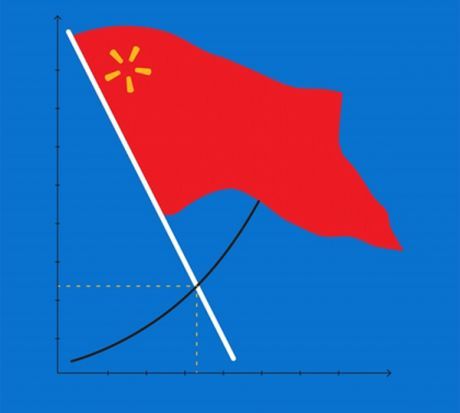Reports
You are here
Planned economics under capitalism – The People’s republic of Walmart – Review

May 28, 2019
What can socialists learn from companies like Amazon and Walmart? A lot! and a socialist future might depend on it. Leigh Philips and Michal Rozworski’s new book, The People’s Republic of Walmart, explores the logistical wonders that are Walmart and Amazon in order contradict arguments against socialism.
These arguments fall under what is commonly referred to as the economic calculation problem or the socialist calculation debate which began in the 1920s. The debate centres around a number of arguments attempting to find the best way to plan an economy. Whether that is through centralized planning or free market logic. The book also includes an economic history of planned economies stretching from Stalinist Russia to Allende’s Chile to present day firms.
People’s Republic of Walmart explores the idea that Walmart and Amazon are not the epitomes of capitalism one might think they are. In fact their day to day operations look more like a planned economy of an authoritarian state. It is from this point the book frames the socialist calculation debate. Economists have argued that socialism cannot work because the economy is too complex to plan out rationally from a centralized point of view. The book argues that not only does socialism not imply centralized planning but the same centralized planning that right wing economists argue is impossible is happening right under our noses with the logistics behind big corporations.
Of course, the heart of socialism is not centralized planning but radical worker democracy. This leads us to one of the books central maxims: socialism does not work in theory but only in practice.
Before you brand this statement heretical, hear me out. The book argues socialism cannot be planned out because socialism requires constant feedback from workers' councils in order to operate democratically and efficiently. There is no way to plan this out ahead of time. As soon as socialism stops taking information and decisions from the bottom up it no longer is socialism but a top down, authoritarian system. The book cites examples of Stalinist Russia in which information from collectivized farms was suppressed or censored. If any information did not fit top down goals it was altered in fear of prosecution. This repression and terror is clearly not socialism. For socialism to work we need democratic feedback. When it comes to planning an economy it is impossible to plan out the decisions that will be made by workers' councils as they operate in real time and adjust their needs in the most democratic way possible. Nor is there a real need to.
It is true, Walmart and Amazon are marvels of the 21st century. They can efficiently move product from a warehouse on one side of the world to the front step of someone’s house on the other in within days. However this book makes it very clear to the reader this does not mean they endorse the companies' horrible working conditions. This makes for a rounder critique and points out what we can learn from Walmart to make the world a better place. Imagine using the advanced algorithms or immense profit of Amazon for the betterment of society and not just for making Jeff Bezos more money. If big firms like these are ever to be expropriated an understanding of how they can be used is critical.
As well, understanding how capitalism and the free market generate immense inequality and suffering but maintaining an understanding of how one can use capitalism against itself is a tradition that goes back to Marx’s critique of capital and Lenin’s theory of state. For example, Lenin, in The State and Revolution, describes capitalism as creating the prerequisites of its own transition to communism. Capitalism concentrates workers into one place and intensifies their struggle. Lenin argues these struggles teach us how to come together to fight the system and gives workers insight into how to run the system themselves. Potentially we can use capitalism’s tools of oppression against it in the struggle to overthrow it.
So to be clear, Walmart and Amazon are horrible and both they and capitalism can go away forever. However studying Walmart occupies a unique space in the history of economics. The question is how do we use this understanding to move forward.
Section:
Topics:









